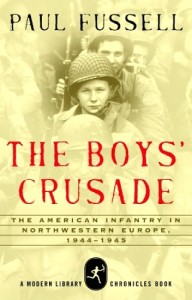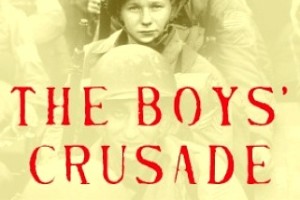 I just finished reading Paul Fussell’s The Boy’s Crusade: The American Infantry in Northwestern Europe, 1944-1945. Paul Fussell was an American who served in WW2 before coming back and becoming an author and university professor. He passed away last month. I was first exposed to his writings through the article The Real War that appeared in The Atlantic.
I just finished reading Paul Fussell’s The Boy’s Crusade: The American Infantry in Northwestern Europe, 1944-1945. Paul Fussell was an American who served in WW2 before coming back and becoming an author and university professor. He passed away last month. I was first exposed to his writings through the article The Real War that appeared in The Atlantic.
Crusades breaks from the convention set by other history books, whereby events are explained on a macroscopic level and the participants reduced to movements and statistics. This title instead looks at specific chapters of the Second World War from the perspective the infantrymen who experienced its consequences first hand. As Fussell notes, romanticism and such notions as that of a “good war” quickly break down when it is seen for oneself.
Fussell’s work brings balance to the clean black-and-white characterizations of WW2 demonstrated in Hollywood films. He talks of the Allied bombing of villages as a diversion, bombers knocking out entire divisions of their own ground forces, platoon leaders who sent the newest replacements ahead so they could die instead of their longer-serving comrades, intestines littering trees like Christmas decorations, etc. It would be a disservice to characterize the knowledge of these darker chapters as being anti-American or whatnot. These aren’t fictitious happenings, they are a real component of war. Bias does not emanate from learning more, but of ignoring that knowledge when it presents itself.
We filter, to this day, reports from war zones. So complete is our censorship that it distorts our perceptions of war itself, a fact not lost on John Steinbeck when he wrote of his reporting days “I don’t mean that the correspondents were liars. . . . It is in the things not mentioned that the untruth lies.” When the negative aspects do filter through, they are mistaken for an aberration. It is this kind of one-sidedness that allows for the young to seek out war to prove themselves, and the old to be so willing to grant them that wish.
This is a short book, and it made me want to read another of Fussell’s work, Wartime: Understanding and Behavior in the Second World War.
